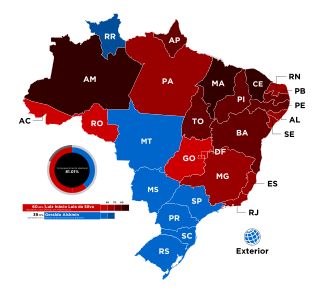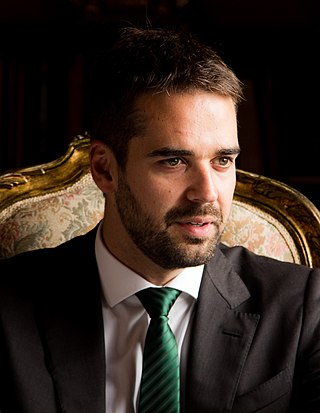
The Brazilian Social Democracy Party, also known as the Brazilian Social Democratic Party or the Party of Brazilian Social Democracy, is a centre-right political party in Brazil. As the formerly third largest party in the National Congress, the PSDB was the main opposition party against the Workers' Party (PT) administrations of Luiz Inácio Lula da Silva and Dilma Rousseff from 2003 to 2016.

The Democratic Labour Party is a political party in Brazil.

Progressistas is a centre-right to right-wing political party in Brazil. Founded in 1995 as the Brazilian Progressive Party, it emerged from parties that were successors to ARENA, the ruling party of the Brazilian military dictatorship. A pragmatist party, it supported the governments of presidents Fernando Henrique Cardoso, Luiz Inácio Lula da Silva, Dilma Rousseff, Michel Temer and Jair Bolsonaro. Largely it was the party of the politics of Paulo Maluf, a former governor and mayor of São Paulo. Of all political parties, in corruption investigation Operation Car Wash, the Progressistas had the most convictions.

Germano Antônio Rigotto is a Brazilian politician currently affiliated to the MDB.

Olívio de Oliveira Dutra is a Brazilian politician. He is a founding member of the Workers' Party.

Yeda Rorato Crusius is an economist and was governor of the Brazilian state of Rio Grande do Sul from January 1, 2007, until December 31, 2010. She was the first female governor of the state. She wrote her autobiography.

General elections were held in Brazil on 6 October 2002, with a second round of the presidential election on 27 October. The elections were held in the midst of an economic crisis that began in the second term of the incumbent president, Fernando Henrique Cardoso of the centre-right Brazilian Social Democracy Party (PSDB). Due to constitutional term limits, Cardoso was ineligible to run for a third consecutive term.

Antonio Britto Filho is a Brazilian journalist and politician, who held the positions of Congressman, Social Security Minister, and Governor of the state of Rio Grande do Sul.

General elections were held in Brazil on 1 October 2006 to elect the president, National Congress and state governors, with a second round of the presidential election on 29 October as no candidate received more than 50% of the vote in the first round.

The state elections in Rio Grande do Sul in 2010 were held at the same time as Brazil's federal elections October 3. Since 1994, as a result of a constitutional amendment that reduced the presidential term to four years, all federal and state elections in Brazil are held on the same date. The state elections decide governors and the membership of the State Legislative Assemblies. Additionally, members of Congress are elected by the people of each state.

Fábio Medina Osório is a lawyer, professor, and former Attorney General of Brazil. He is the former State Prosecutor of Rio Grande do Sul, and was appointed Attorney General of Brazil by Acting President Michel Temer.

Reinaldo Azambuja Silva is a Brazilian politician and businessman who served as the 11th Governor of Mato Grosso do Sul from 2015 to 2022. In elections in Mato Grosso do Sul in 2014 he ran for governor, came in second place in the first round and won the election in the second round against the candidate Delcídio Amaral.

Eduardo Figueiredo Cavalheiro Leite is a Brazilian politician and governor of the state of Rio Grande do Sul. During the state's 2018 election, he won with 53.62% of the vote. Leite was elected governor at 33 years old, becoming the youngest governor in Brazil. In July 2021, Leite came out as gay during an interview for the Brazilian talk show Conversa com Bial, becoming the first openly gay governor in Brazil's history, and second openly LGBT governor in Brazil after Fátima Bezerra of Rio Grande do Norte.

The 2021 PSDB presidential primary was held on 21 and 27 November 2021 to elect the Brazilian Social Democracy Party presidential nominee.
The 2022 Rio Grande do Sul state election took place in the state of Rio Grande do Sul, Brazil on 2 October 2022. Voters elected a Governor, Vice Governor, one Senator, 31 representatives for the Chamber of Deputies and 55 Legislative Assembly members, with a possible second round to be held on 30 October 2022. Former governor Eduardo Leite, was eligible for a second term and announced that he's running for reelection.

Ranolfo Vieira Júnior is a Brazilian civil police officer and politician, member of the Brazilian Social Democracy Party (PSDB). He was elect Vice Governor of Rio Grande do Sul in the 2018 state elections. Under Eduardo Leite governorship, Vieira also was nominated State Secretary of Public Security. After Leite's resignation in March 2022, Vieira became the Governor of Rio Grande do Sul.

The governor of Rio Grande do Sul is the head of government of the state's executive branch, assisted by his secretaries, whom he freely chooses. Elected by absolute majority in universal suffrage, together with the vice-governor, his term lasts four years; since 1997, reelection has been possible, and although all have sought it, none has succeeded. The current governor is Eduardo Leite, since January 1, 2023.

The 2022 Mato Grosso do Sul state election took place in the state of Mato Grosso do Sul, Brazil between 2 October 2022 and 30 October 2022. Voters elected a governor, vice governor, a senator, 8 representatives for the Chamber of Deputies of Brazil and 24 Legislative Assembly members. The incumbent governor at the time, Reinaldo Azambuja, wasn't allowed to run for reelection for a third consecutive time due to term limits established by the Federal Constitution of Brazil.
General elections will be held in Brazil on 4 October 2026 to elect the president, vice president, members of the National Congress, the governors, vice governors, and legislative assemblies of all federative units, and the district council of Fernando de Noronha. If no candidate for president or governor receives a majority of the valid votes in the first round, a runoff election is held on 25 October.

Miguel Soldatelli Rossetto is a Brazilian sociologist, trade unionist, and politician affiliated with the Workers' Party (PT), which he helped to establish along with the Central Única dos Trabalhadores (CUT). Rossetto was the minister of Agrarian Development in both the first Lula and Rousseff administrations; he was also the president of Petrobras Biocombustível from May 2009 to March 2014, and later became the Secretary-General of the President of the Republic and the Minister of Labour and Employment in the Rousseff administration. Prior to his career in the federal government, he was the vice-governor of the state of Rio Grande do Sul during the administration of Olívio Dutra.



















